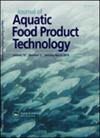Effects of Different Antioxidants of Bamboo Leaves Treatments on Lipid Oxidation of Scallop (Argopecten irradians) Adductor Muscle During Hot Air Drying
IF 1.3
4区 农林科学
Q4 FOOD SCIENCE & TECHNOLOGY
引用次数: 1
Abstract
ABSTRACT The effect of different antioxidants of bamboo leaves (AOB) treatment on lipid oxidation of scallop (Argopecten irradians) adductor muscle during hot air drying was investigated. The results demonstrated that the marinated sample had the lowest peroxide value, thiobarbituric acid-reactive substances, polyunsaturated fatty acids loss, free radical level, and lipoxygenase activity during drying, indicating that the marination process maximized the antioxidant effects of AOB. The results indicate that this process could interfere with free radical chain reaction and inhibit lipoxygenase activity since AOB is correctly distributed on the site of lipid oxidation. After drying, eicosapentaenoic acid + docosahexaenoic acid content in control, unmarinated, and marinated samples decreased by 26.10%, 11.25%, and 7.29%, respectively, suggesting that the marination process maintained more efficiently its high nutritive value in terms of lipid content. Overall, the use of AOB provides a more effective strategy to control lipid oxidation in seafood, mainly scallops, during drying.竹叶不同抗氧化剂对扇贝(Argopeten irradians)增肌在热风干燥过程中脂质氧化的影响
摘要研究了不同竹叶抗氧化剂处理对热风干燥过程中扇贝内收肌脂质氧化的影响。结果表明,腌制样品在干燥过程中过氧化值、硫代巴比妥酸活性物质、多不饱和脂肪酸损失、自由基水平和脂氧合酶活性最低,表明腌制过程使AOB的抗氧化作用最大化。结果表明,由于AOB正确分布在脂质氧化部位,这一过程可能干扰自由基链反应,抑制脂氧合酶活性。干燥后,对照、未腌制和腌制样品的二十碳五烯酸+二十二碳六烯酸含量分别下降了26.10%、11.25%和7.29%,说明腌制过程更有效地保持了油脂含量方面的高营养价值。总的来说,使用AOB提供了一种更有效的策略来控制海产品(主要是扇贝)在干燥过程中的脂质氧化。
本文章由计算机程序翻译,如有差异,请以英文原文为准。
求助全文
约1分钟内获得全文
求助全文
来源期刊
CiteScore
3.50
自引率
6.20%
发文量
77
审稿时长
7 months
期刊介绍:
The Journal of Aquatic Food Product Technology publishes research papers, short communications, and review articles concerning the application of science and technology and biotechnology to all aspects of research, innovation, production, and distribution of food products originating from the marine and freshwater bodies of the world. The journal features articles on various aspects of basic and applied science in topics related to:
-harvesting and handling practices-
processing with traditional and new technologies-
refrigeration and freezing-
packaging and storage-
safety and traceability-
byproduct utilization-
consumer attitudes toward aquatic food.
The Journal also covers basic studies of aquatic products as related to food chemistry, microbiology, and engineering, such as all flora and fauna from aquatic environs, including seaweeds and underutilized species used directly for human consumption or alternative uses. Special features in the journal include guest editorials by specialists in their fields and book reviews covering a wide range of topics.

 求助内容:
求助内容: 应助结果提醒方式:
应助结果提醒方式:


